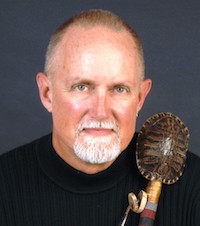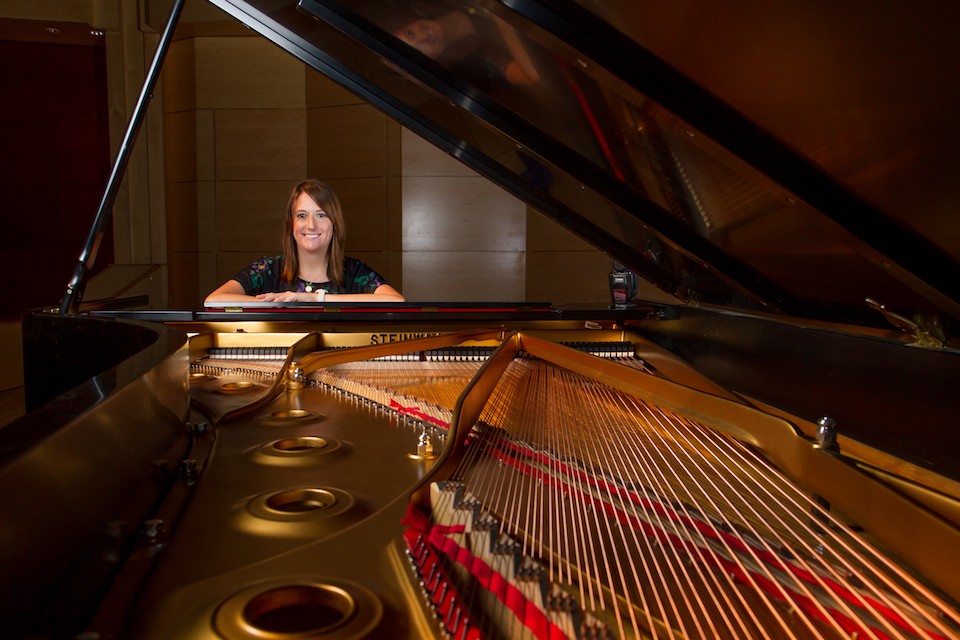Professor and former student published together

Stephanie Miller spent her time at Radford working toward her M.S. degree in Music Therapy under the mentorship of Music Professor Jim Borling.
Her final clinical project involved a 12-week music therapy group for women recovering from addiction while residing in a therapeutic community. The fruits of her labors resulted in Miller being published alongside her mentor in “Music and Medicine: An Interdisciplinary Journal,” an international journal that receives submissions from music therapists as well as medical doctors.
Miller, now a board-certified music therapist (MT-BC) at Palm Beach Music Therapy Institute, which serves the Joe DiMaggio Children’s Hospital in Florida, and Borling were invited to submit work to a special edition of the “Music and Medicine” journal covering music therapy and addictions.
Her submission, titled “Music Therapy and Mindfulness: Treating Women with Addiction in a Therapeutic Community,” stemmed from the time and effort working on her clinical project.
“I put so much work into the clinical project that I finished I thought to myself, ‘I would really like to publish this one day,’” Miller said. “My clinical project was the bulk of this article. Without my work at Radford, this would not have been possible.”
Miller’s clinical work at Radford University prepared her for the challenges she handles daily.
“In children's hospitals, there are babies who are born from those with addiction,” Miller said. “The babies often have withdrawal symptoms which can cause pain, agitation and sensory stimulation problems.”

Stephanie Miller, pictured in the Performance Hall in the Covington Center for Visual and Performing Arts, while she attended Radford University.
The steps Miller is taking now is a continuation of her work at Radford, where she took the necessary risks to be successful. At Radford, she combined work from other fields with new research, to define herself in the field of music therapy.
“One of the things that Stephanie brought together in her work is the profession of music therapy combined with substance abuse,” Borling said. “She is blending music therapy and mindfulness into a viable treatment model. It’s innovative by meeting the needs of modern day women who fight addiction. She’s really on to something.”
As a practitioner that has worked with patients struggling with addiction for more than two decades, Borling drew upon his many experiences to craft a theoretical framework in his submission to the journal.
“What I’ve come to learn is that recovery happens on several levels,” Borling said. “The first and most important is what I would call the bio-physical and that is to get physically clean of one’s drug of choice. Recovery and sustained sobriety requires what I’m calling stage two recovery, which is an application of both the psycho-emotional and psycho-spiritual aspects of human being so that you can really move back into an authentic way of living.”
Borling defined the achievement and maintenance of authentic living as stage two recovery, which has its roots in the twelve-step process and Maslow’s hierarchy of needs.
“I’m convinced that through music therapy – and through the music experience – we can re-awaken those things and reconnect and begin to reintegrate them,” Borling said. “Addiction separates us from that, it takes that away from us.”
The second aspect of the stage two recovery is defined by Borling as psycho-spiritual recovery.
“For some this is traditional religion, while for others it is just a deeper appreciation of nature or coming back into a community of people that says I belong here,” Borling said. “If a person is in early recovery and achieves the physical recovery, they can continue this process of emotional growth, social growth and spiritual growth. They can then sustain sobriety.”
Both practitioners base their work on traditional aspects of music therapy while observing modern trends in the field.
In addition to the two publications, Radford University graduate student Anthony Kaseoru and Assistant Professor of Music Trish Winter are presenting their work with the Radford Preschool Language Lab to the 15th World Music Therapy Congress this summer.